Last Updated on August 2, 2021
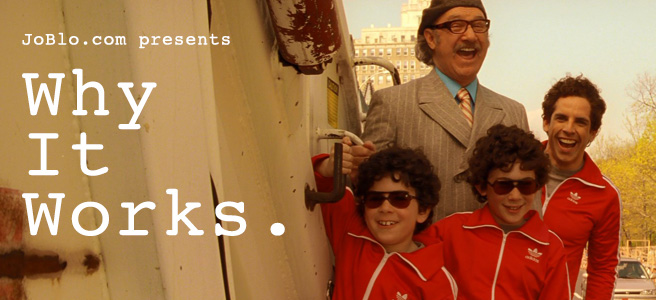 Why It Works is an ongoing column which breaks down some of the most acclaimed films in history and explores what makes them so iconic, groundbreaking, and memorable.
Why It Works is an ongoing column which breaks down some of the most acclaimed films in history and explores what makes them so iconic, groundbreaking, and memorable.
****SPOILERS AHEAD****
When it comes to celebrating and dissecting outside-the-box movies, as we tend to do with Why It Works, few directors fit the bill quite like Wes Anderson. Known for making films which are both highly stylized and well-received by movie goers and critics alike, the filmmaker has dazzled us from his early beginnings with BOTTLE ROCKET to his recent tour de force, THE GRAND BUDAPEST HOTEL. This week, we're looking at Anderson's first major ensemble piece, THE ROYAL TENENBAUMS, which, along with RUSHMORE, would set the tone for much of his career. THE ROYAL TENENBAUMS features a large cast, offers little in the way of plot, and is one of the quirkiest and most memorable films to come out of the early 2000's. Here's why it works:
WHY WE LIKE THE CHARACTERS:
THE ROYAL TENENBAUMS certainly doesn't take the traditional filmmaking 101 approach of getting us to like the characters by introducing their noble pursuits or benevolent actions. Instead, we are presented with a smorgasbord of eccentrics, all of whom have their good side and bad- and none of whom are boring. The palette of personas is rich and diverse enough that we don't feel like we're simply getting a dozen people speaking with Wes Anderson's voice, and it doesn't take long for us to learn the emotional core of what drives these apparent caricatures. Royal attempts to reconcile with his family only when he becomes broke and needs a place to stay but soon realizes how much affection he has for them, Richie is dealing with a very deep depression and unrequited love, Margot has little interest in her husband or her lover and has long given up her onetime passion for playwrighting, and Chas, valuing success and pragmatism over passion and emotion, is still dealing with the loss of his wife and needs the affection of those around him more than he lets on. At first glance, the characters here are simply wacky and entertaining, but we very quickly fall in love with them as we discover what lies below the peculiar surface.
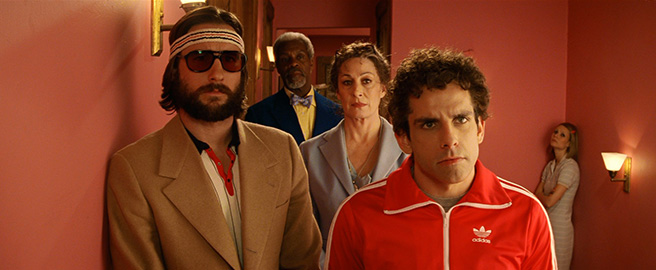 Leave it to Wes Anderson, cinematographer Robert Yeoman, and company to know how to frame a shot.
Leave it to Wes Anderson, cinematographer Robert Yeoman, and company to know how to frame a shot.
WHY WE CARE:
Depending on how you look at it, THE ROYAL TENENBAUMS either has a complicated plot, a simple plot, or no plot at all. Yes, we are following several characters, most of whom have their own mini-drama in addition to how they connect with the main story, but the heart of the film is something much more understated. Simply put, the Tenenbaums are a broken, troubled family, and they need each other to heal. Since Royal is introduced as a bit of an ass, and we know his plan to reconcile with his family is a selfish ploy, we're not really rooting for him to succeed. The same applies to many of the stories early on, and yet something has us hooked. We may not be invested in the narrative yet, but we are absolutely entertained. As we follow Royal's infiltration and his scheming with Pagoda, Chas' fire drill, Margot's relationship with Raleigh and Eli, and Richie's travels, there's something entertaining, amusing, and fascinating about every scene. Eventually, as we find sympathy for Royal and gain a better understanding of Chas' anxiety, Margot's ennui, and Richie's depression, we find ourselves moving steadily from mere amusement to a sincere connection to the story. Wes, you tricky bastard, you.
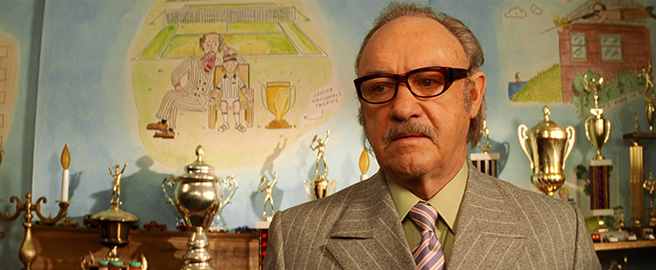 "Immediately after making this statement, Royal realized that it was true."
"Immediately after making this statement, Royal realized that it was true."
WHY WE'RE SATISFIED:
The brightness and levity of Wes Anderson's movies make the dark moments that much more jolting. Richie attempts suicide, Eli crashes his car into the house, killing Buckley the dog, and the epilogue reveals Royal to pass away not long after the events of the film. What this unpredictability and calculated unevenness allows for, though, is the heartwarming moments that might seem schmaltzy in a lesser film. Royal finally makes peace with the family (giving Henry and Etheline his blessing, saving Ari and Uzi's lives, and making amends with Chas), Margot and Richie find solace in each other and begin a secret romance, and Chas finally lets go of his past, letting loose and enjoying time with his family. If that's not enough, a final "where are they now" sequence further ties up loose ends (Eli checks into rehab, Raleigh publishes the successful Dudley's World, etc.). In the same way Wes Anderson's darkness catches us by surprise, so does his warmth. As THE ROYAL TENENBAUMS climatizes its audience to a dry, sarcastic tone while also keeping one foot in reality, the eventual emotional conclusion feels unexpected, welcome, earned, and organic all at once.
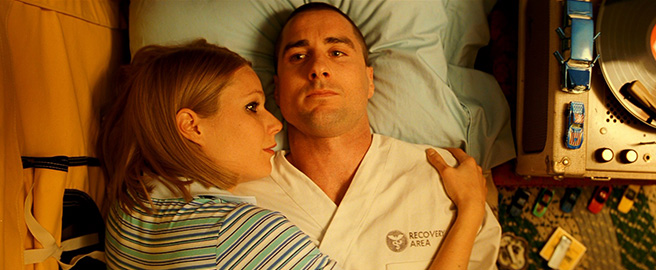 "I think we're just gonna have to be secretly in love with each other and leave it at that, Richie."
"I think we're just gonna have to be secretly in love with each other and leave it at that, Richie."
WHY WE REMEMBER:
As we witness Royal's funeral in the final minute of the film, we see his epitaph: "Died tragically rescuing his family from the wreckage of a destroyed sinking battleship." This moment is Wes Anderson through and through, blending comedy with hardship and walking the line between realist and ridiculous. While the costuming, production design, and cinematography of THE ROYAL TENENBAUMS make each frame look like a piece out of a 1960's fashion photography exhibit and almost every scene features something ridiculous happening in the background or foreground, the characters are multidimensional, troubled, and deal with personal issues to which any of us can relate. Adding to the stylized presentation are the chapter book presentation, Alec Baldwin's delightful narration, and the one-two punch of Mark Mothersbaugh's score and the classic rock/folk-filled soundtrack. The cast features a charismatic Gene Hackman in one of his last film roles (come back, Gene!), Anjelica Huston as the patient, enduring matriarch, and the brilliant talents of Luke Wilson, Gwyneth Paltrow, Ben Stiller, Owen Wilson, Danny Glover, Bill Murray, Kumar Pallana, and more. Finally, Wes Anderson and Owen Wilson's script and Wes' direction are at the heart of the piece, treating us to no end of quotable lines, unforgettable moments, and a story which feels both extremely familiar and like nothing we've ever seen before.
Thoughts? What else worked for you? What didn't? Strike back below!
If you have any movies you'd like to see put under the microscope, let us know below or send me an email at [email protected].






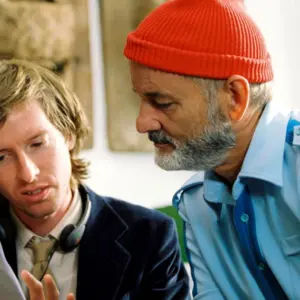













Follow the JOBLO MOVIE NETWORK
Follow us on YOUTUBE
Follow ARROW IN THE HEAD
Follow AITH on YOUTUBE